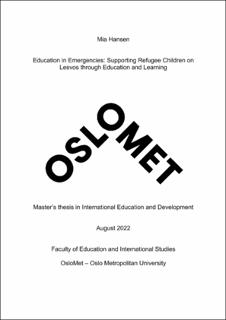| dc.description.abstract | Millions of children are deprived their right to education. Refugee children are specifically vulnerable for being out of school, as statistics show that refugee children are five times more likely to be out of school than other children. In the case of Lesvos, Greece, only 9% of school age refugee children are enrolled to public school, with estimates suggesting only 0.3% attend. Refugee education and Education in Emergencies are a well-established field. Educations’ status as emergency response and its unique potential of being lifesaving, protecting, and providing people with better futures are well acknowledged. Yet, education seems to be de-prioritized. In the case of Lesvos, refugee children have had no real access to public education in seven years. From interviews with teachers and coordinators at various non-formal programs, this research shows how different actors work to support refugee children on Lesvos with educational activities. It shows that education providers on Lesvos face many challenges in their work, most of which are related to the temporal nature of a refugee situation. This research describes and analyzes different elements to refugee education on Lesvos, showing how agents often tend to focus on educations ability to support and protect children in crises. | en_US |
